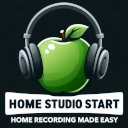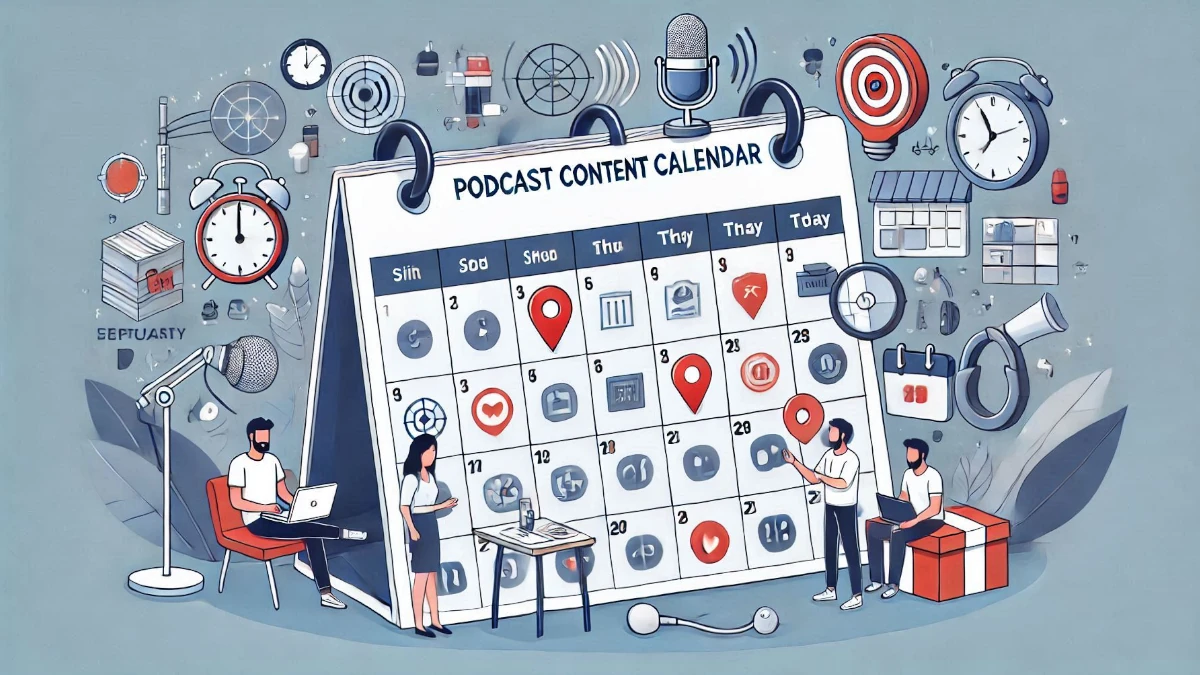Imagine having a podcast that runs as smoothly as a well-oiled machine, consistently delivering high-quality content that resonates with your audience. Sounds ideal, right? But if you’re anything like most podcasters out there, the reality might feel like a frantic scramble to produce weekly episodes without enough time to ensure they’re top-notch. You’re not alone! Many podcasters share this struggle. The secret weapon to conquering this chaos? A content calendar.
In the world of podcasting, it’s easy to underestimate the power of organization. Yet, mastering the art of effective planning can elevate your podcasting game to new heights—turning it from a hobby into a thriving creative business. So, how do you transition from disarray to a flawlessly scheduled content lineup that not only keeps your listeners engaged but also expands your reach?
That’s where creating and managing a content calendar comes in. This approach isn’t just a fancy term for “planning ahead”—it’s your new best friend in ensuring that your podcast content is cohesive, strategic, and impactful. We’ll guide you through every step of the journey, transforming you into a podcasting whiz. Ready to discover how the pros do it? Let’s dive in and explore how a robust content calendar can keep your podcast ahead of the curve!
1. Understanding Podcast Content Strategy
Creating a successful podcast begins with a well-thought-out content strategy. Imagine content strategy as the blueprint for your podcast’s success. It lays out the roadmap that guides you in choosing topics, understanding your audience, and scheduling episodes effectively. When linked to creating and managing a content calendar, a content strategy becomes the backbone that ensures consistency and relevance.
Start by identifying your podcast’s niche and target audience. Knowing who you’re speaking to shapes the topics you discuss and the way you present them. For instance, if your podcast is about music production, your content should cater to aspiring producers, music enthusiasts, or even seasoned musicians looking to stay updated with industry trends.
Next, brainstorm a list of potential topics. Think about the questions your audience might have or the problems they encounter. If your podcast focuses on music production, topics could range from “How to Choose the Right DAW” to “Top Mixing Tips from Industry Experts.” These topics can then be strategically placed on your content calendar, ensuring a balanced mix of educational, entertaining, and engaging episodes.
An actionable tip is to incorporate audience feedback. Encourage listeners to share their thoughts or suggest topics. This not only enriches your content but also fosters a sense of community. By aligning your content strategy with a content calendar, you maintain a steady flow of episodes, avoid last-minute scrambles, and create a cohesive podcast experience that keeps listeners coming back for more.
2. Tools and Software for Content Calendar Management
Creating and managing a content calendar for your podcast can seem like a daunting task. However, the right tools and software can transform this process into an organized and efficient workflow. Selecting the right tools not only saves time but also enhances your ability to plan, produce, and publish consistently engaging content.
Google Calendar
Google Calendar is a simple yet effective tool for managing your podcast content schedule. It’s accessible, free, and offers robust integration with other Google Workspace apps. Use it to mark important dates, deadlines, and recording sessions. For example, set recurring reminders for weekly episode planning or guest interviews. This keeps your team synchronized and aware of the timeline.
Trello
Trello is a versatile project management tool that works wonders for content calendar management. Its board and card system allows you to create a visual workflow of your podcast schedule. Imagine having a board for each month, with cards representing each episode. You can attach scripts, notes, and links directly to cards, ensuring everything related to each episode is in one place.
Asana
Asana is another powerful tool that helps you manage your podcast’s content calendar. Its task-oriented approach lets you break down the production process into manageable steps. Assign tasks like “Research Guest” or “Edit Episode” to specific team members with due dates, ensuring accountability and progress tracking.
Notion
Notion offers a customizable workspace that can function as an all-in-one podcast management tool. Use it to create a content calendar, plan episodes, and store research in one integrated platform. Its flexibility allows you to tailor it to your specific needs, whether you prefer a calendar view or a task list format.
To make the most out of these tools, start by determining the needs of your podcast production and choose the one that aligns best with your workflow. Experiment with different features and integrations to find what optimizes your content management process. Combining these tools with a clear strategy will not only streamline your production but also enhance the quality and consistency of your podcast content.
3. Workflow Optimization for Content Creation
Creating a content calendar for your podcast is not just about scheduling episodes; it’s about optimizing your workflow to ensure smooth production from start to finish. By streamlining processes, you can save time, improve quality, and reduce stress.
Define Your Steps
First, outline the critical steps in your content creation process. For instance, break down tasks into research, scripting, recording, editing, and publishing. Having a clear roadmap ensures nothing falls through the cracks. Consider using project management tools like Trello or Asana to track progress through each phase.
Batch Similar Tasks
Bunching similar tasks together can significantly enhance productivity. Allocate specific days for recording multiple episodes, then dedicate other days to editing. This method, known as batching, reduces the mental effort of switching gears. For example, if you’re in a creative flow while scripting, write several scripts at once rather than stopping to record and edit.
Utilize Templates
Templates can be a game-changer for repeated tasks. Design a template for your episode outlines, guest communication emails, or social media posts. This consistency not only saves time but also maintains brand coherence. For instance, having a pre-designed email template for guest outreach can quickly personalize messages without starting from scratch each time.
Leverage Automation Tools
Automation is your best friend in content management. Use tools like Zapier to automate routine tasks such as social media posting or email updates. For instance, set your podcast to automatically post to all platforms once it’s uploaded, freeing you to focus on content quality rather than distribution logistics.
By optimizing your workflow, not only do you create a more manageable content calendar, but you also free up mental space to focus on what truly matters: engaging and growing your audience.
4. Collaborative Content Calendar Management
Creating and managing a content calendar for your podcast doesn’t have to be a solo endeavor. In fact, embracing collaborative content calendar management can significantly enhance the quality and consistency of your podcast episodes. Involving your team or collaborating with guests can bring fresh perspectives and ideas, ensuring your content stays dynamic and engaging.
Leverage Technology for Seamless Collaboration
Tools like Asana, Trello, and Google Calendar can transform your content calendar into a collaborative hub. These platforms allow multiple users to view, edit, and comment on tasks. By creating a shared calendar, everyone involved in the podcast can stay informed about deadlines, recording sessions, and release dates. For instance, using Trello’s card system, you can assign tasks like “Research guest background” or “Edit episode” to different team members, ensuring accountability and clarity.
Effective Communication is Key
Regular meetings and communication channels such as Slack or Microsoft Teams are crucial for keeping everyone on the same page. Schedule weekly or bi-weekly check-ins to discuss upcoming episode themes, guest bookings, and promotional strategies. These meetings can also serve as brainstorming sessions, allowing team members to pitch ideas and share feedback.
Case Study: The Power of Collaboration
Take the example of the popular podcast Freakonomics Radio. Their team utilizes a collaborative content calendar to coordinate scripts, guest interviews, and release schedules. This ensures that everyone from researchers to editors is aligned, resulting in a polished final product that consistently engages their audience.
By embracing collaborative content calendar management, you not only streamline the production process but also foster a sense of teamwork and shared vision. This approach can elevate your podcast, making it a more enriching experience for both your team and your listeners.
5. Analyzing and Adjusting Your Content Calendar
Creating and managing a content calendar for your podcast doesn’t end when you’ve filled in all the slots. Analyzing and adjusting your content calendar is crucial to ensure it remains a dynamic tool that reflects your podcast’s evolution. This process helps you gauge what’s working, what isn’t, and where adjustments can enhance your podcast’s impact.
Track Audience Engagement
Start by examining how your audience interacts with different episodes. Use analytics tools to assess metrics like downloads, listens, and listener retention rates. For example, if an episode on music production trends garners more attention, consider increasing similar content or scheduling follow-up discussions. By identifying patterns, you can tailor future content to match audience preferences.
Evaluate Content Performance
Look at the performance of your episodes over time. Are there consistent peaks and troughs? Perhaps episodes featuring guest interviews or specific topics consistently perform better. Use these insights to adjust your calendar, scheduling high-performing content types more frequently. A/B testing different formats or themes can also provide valuable data on listener preferences.
Stay Flexible and Responsive
Being too rigid with your calendar can restrict creativity and responsiveness to new opportunities. If a trending topic emerges, don’t hesitate to shift your schedule to accommodate timely content. For instance, if a new music software release is creating buzz, consider an impromptu review or discussion episode, even if it wasn’t initially planned.
Regular Review Sessions
Set aside time for regular review sessions, perhaps monthly or quarterly, to assess overall strategy and content performance. In these sessions, gather feedback from co-hosts or your production team to gain different perspectives on what’s working well and what needs tweaking. This collaborative approach ensures your content calendar remains a living document that evolves with your podcast.
By consistently analyzing and adjusting your content calendar, you’re not just keeping your podcast on track; you’re ensuring it grows and thrives in an ever-changing digital landscape.
Conclusion
In wrapping up our exploration of creating and managing a content calendar for your podcast, it’s clear that organization and strategic planning are the foundations of success. By diligently implementing a content calendar, podcasters not only gain clarity but also ensure a consistent delivery of quality content. We’ve discussed the importance of defining your podcast’s goals and audience, the value of planning ahead with a flexible structure, and the benefits of utilizing tools that streamline scheduling and content creation.
A systematic approach to planning allows for creativity to flourish within established bounds, ensuring that each episode serves a greater purpose and meets audience expectations. Furthermore, regularly reviewing and adjusting your content calendar keeps your podcast responsive to both audience feedback and topical trends, sustaining its relevance in a rapidly changing landscape.
Now that you’re armed with these insights and strategies, it’s time to put them into action. Start by drafting a simple content calendar template, brainstorming content ideas, and setting realistic deadlines. Don’t hesitate to experiment and find what works best for you and your podcast. Most importantly, enjoy the process of enhanced creativity and productivity!
Ready to elevate your podcast game? Begin building your content calendar today and watch how it transforms your podcast from a reactive content machine to a proactive, audience-focused powerhouse. For further guidance, tips, and industry updates, subscribe to our newsletter and join our podcasting community to connect and grow with fellow podcasters. Let’s revolutionize your podcast together!

